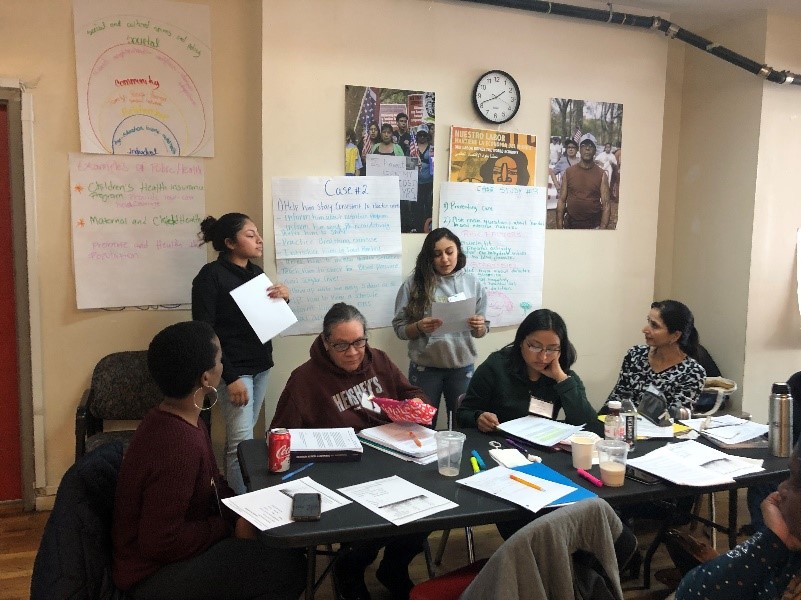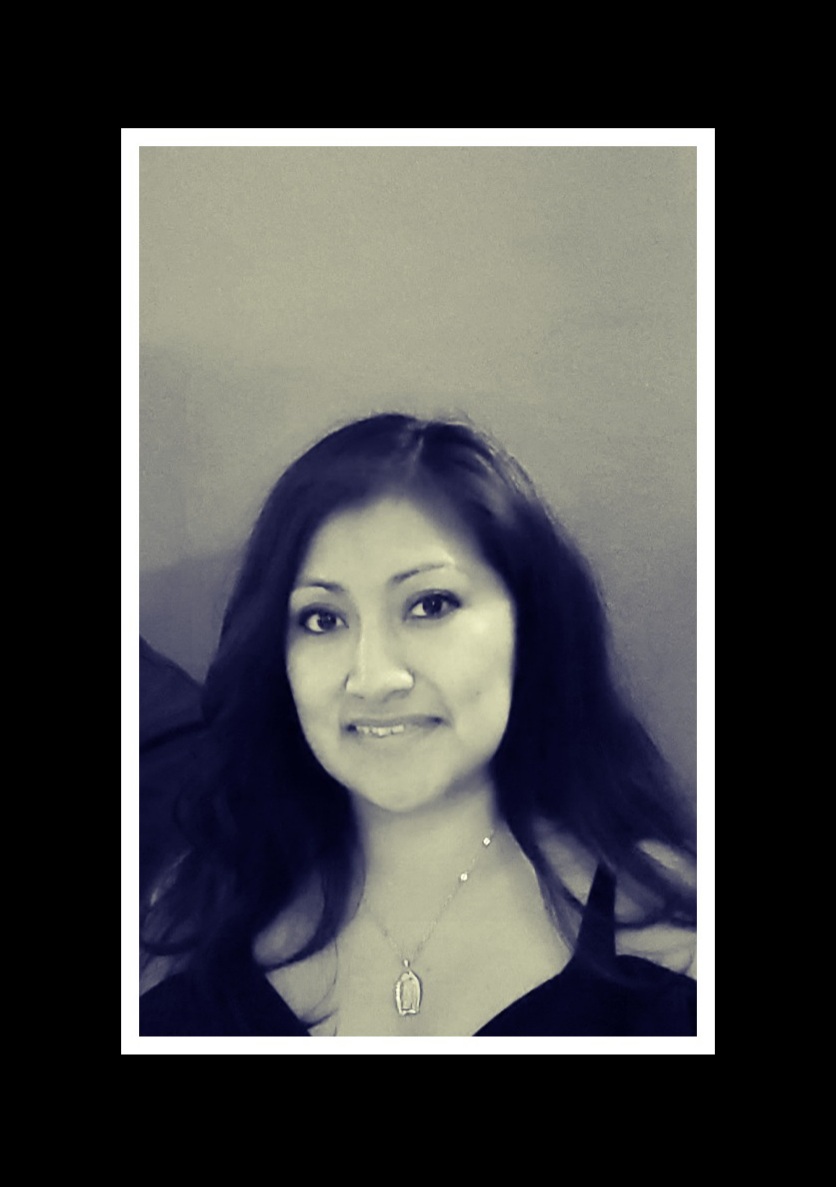The Steelworkers Charitable and Educational Organization, United Steelworkers
The Steelworkers Charitable and Educational Organization (SCEO) represents the nonprofit arm of the United Steelworkers. Over the past decade, SCEO has evolved in delivering comprehensive training to thousands of workers in hazardous waste, HAZMAT disaster preparedness, and environmental careers across the nation. Ashlee Fitch is the lead and principal investigator for the SCEO. The organization’s ECWTP is led by Maiber Solarte, community health worker (CHW) training coordinator with Make the Road New York (MRNY).
Target Populations: The SCEO’s ECWTP serves underserved communities in New York City.
Training Strategy: Operated through MRNY in collaboration with the Tony Mazzocchi Center, the SCEO’s ECWTP uses a unique model that provides a combination of health, wellness, and occupational safety and health trainings to aspiring community health workers.
Impact: MRNY trains cohorts of 20-25 individuals in each training cycle. Over the last five years, they have trained a total of 140 individuals.
The origin of the SCEO’s ECWTP can be traced back to the aftermath of Hurricane Sandy. In 2012, the Category 2 storm ravaged New York City, leaving many underserved and underemployed communities disproportionately exposed to environmental hazards. As a result of these exposures, communities were left to cope with many health risks and disparities. The aftermath of the storm revealed a critical need in community health, which SCEO and its partners are working to fill.
In 2015, SCEO engaged with the Labor Institute and MRNY, one of New York City’s largest community-based organizations with more than 24,000 members. The goal of this effort was to amplify MRNY’s community driven efforts. Together, the organizations established an ECWTP model that trains immigrants to be CHWs, a critical service for underserved communities that experience health disparities.
“Our community health workers are primarily low-income, immigrant women,” said Solarte. “When we have experts that are trained to provide culturally sensitive services, health education, and an understanding of workers’ rights to individuals within their own communities, then we see stronger, more confident, and healthier individuals and communities.”
Another important aspect of the CHW program is its focus on environmental and occupational health and safety. Program trainees receive health education and training, life skills development, and job preparation. In addition to these topics, they also take other specialized courses, such as a 10-hour Occupational Safety and Health Administration course and an infectious disease management course.

(Photo courtesy of Maiber Solarte, MRNY)
“This program is unlike any other community health worker program in the country,” said Jim Young, co-director of the Labor Institute. “The outcome of that is a dynamic workforce that understands how to respond to situations, such as public health emergencies. The trainees understand the array of exposures that many low-wage, immigrant workers encounter on a day-to-day basis.”
MRNY places an emphasis on training participants to resemble the communities they serve, which helps to build mutual understanding and sustainable relationships. In their recent training cohorts, women made up 80% of the trainees and 64% identified as Latino. More than half of the trainees who completed the training found new employment in the health sector.
CHW program graduates are becoming leaders in their communities. “A lot of our students are women, some of whom have been unemployed or underemployed for a long time,” said Solarte. “The increase in average hourly wages is about $5.50 and the job placement is about 67%. We have been able to place a lot of disadvantaged people in career track jobs which has a great impact on them, their families, and the communities they live in.”
The CHW program has adapted and steadily grown. Since 2016, 111 trainees have successfully completed the MRNY training, increasing the cohort size by nearly 30%. In their previous two cohorts, trainees received a total of 505 hours of classroom training, 9,827 contact hours, and an additional 135 hours dedicated to trainees’ internships.
The CHW program has utilized participant feedback to work on trainees’ schedules. One significant change has been to shorten the course from six months to four months. “The placement rate has really gone up,” said Young. “It has been a really positive thing about the program. That's in direct response to tailoring the program to make it more tenable for people that are taking time away from their work and families to complete the course.”
Another supplement to the program is the internship, which for some trainees, become their future employers. The internships offer pivotal opportunities for trainees to shadow professional CHWs and develop networks. Trainees are able to practice community health outreach, conduct health education trainings and surveys, and participate in further trainings. Internships have included positions with MRNY Health Team, HealthFirst Clinical Partnerships, Riseboro, Plaza del Sol Family Health Center, Northern Manhattan Perinatal Partnerships, and others.
The SCEO ECWTP is delivering trainings at a vital time during the COVID-19 pandemic. Similar to Hurricane Sandy, the outbreak in New York City has created a public health emergency, requiring emergency response mobilization. MRNY is currently deploying CHWs to address at risk children and adults with chronic conditions. “The work that our CHWs are doing is critical,” said Solarte. “We are able to connect at-risk individuals with life-saving services, such as delivering meals, and explaining how to manage and treat symptoms related to COVID-19.”

(Photo courtesy of Maiber Solarte, MRNY)
As the SCEO ECWTP continues to grow, the COVID-19 pandemic highlights the critical links between communities and health services provided through CHWs. These collaborative efforts include addressing future topics, such as opioids in the workplace and exposures to hazardous chemicals.
“Whether it is a global infectious disease, a climate-related disaster, or a workplace catastrophe, looking forward, we know there is a growing need for on-the-ground advisors and navigators in the worst and first-hit communities,” said Young. “Community health workers fill all of those roles. It is an impressive hybrid that is going to be increasingly needed in communities.”

R. Coyotl, Recent MRNY CHW Graduate
R. Coyoltl decided to pursue a career in health. First, she took the Bridge to Health Career Course and gained confidence in her English skills. Throughout the CHW training, she learned the importance of teaching communities the importance of good health and healthy lifestyles. Coyoltl completed an internship at MRNY doing outreach and referral services in Queens, New York. She is proud to know that she is helping her community while pursuing her professional goals. This training has helped boost her self-confidence and taught her how to talk to people about their wellbeing and access to healthcare.
to Top


